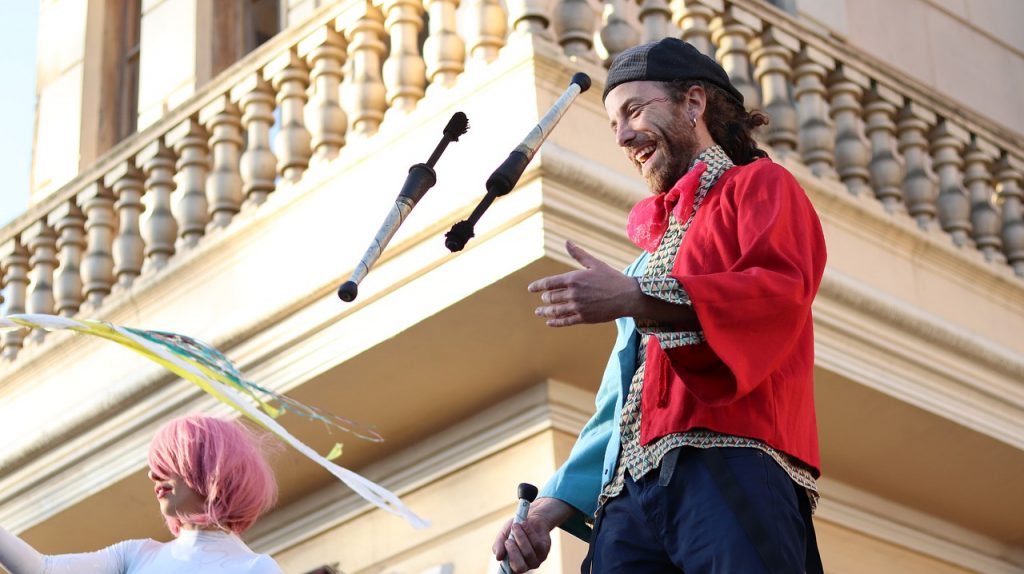Juggling Is A Lesson
“The Juggler” by Richard Wilbur is a poem about a juggler usually seen on the street. Yet Wilbur sees the juggler as a champion, someone who has conquered “gravity” both physically and metaphorically. This juggler is more than someone fun to watch: he brings light into our darkened hearts and lives full of melancholy.
Photo by GonzaKnox from Pixabay
The poem starts not with the juggler but a ball, an implied metaphor for a person or people. “It’s not a light-hearted thing.” On the surface, this would simply describe how gravity pulls a ball down. But as people, “gravity” becomes life’s burdens, weighing us down. We hate our motivation to continue on the next day, or our own “resilience.”
“Falling” describes a rest from the troublesome grind of the world, and we love our moments of relaxing and doing nothing. Yet “the earth falls,” and we can’t stop feeling sorrowful. “Brilliance” is defined as “excellence,” or us gaining success from weathering the storm to completion, if only temporarily (“settles and is forgot”). Though we know we will eventually triumph over struggle and return to a better place, we hate to crash again into the cycle of success, then trouble again. “It takes a… juggler with five red balls” gives us a perspective outside the cycle, or to “shake gravity up.”
In the second stanza, the balls are “learning the ways of lightness.” In the unspoken yet understood language of juggling, we are shown how to “lightly” carry our burdens with optimism. The balls, now representing these burdens, “alter to spheres,” or resemble the planets. These large objects in empty space carry their weight gracefully. The use of “courses” in the next stanza continues the implied metaphor by paralleling the planets’ orbits, which they “cling” to, never colliding, despite their size. Their actions encourage us to carry our burdens gracefully so we can still stay “on course.” The description “small heaven about his ears” demonstrates harmony and the avoidance of crashing under the heaviness of our woes.
The third stanza is a literary and literal transition as the performer switches from juggling to his balancing act. Juggling, or carrying burdens with grace, is a paradise, but it cannot go on forever because “A heaven is easier made of nothing at all.” The load of the daily grind needs to be lightened, or we risk having the “earth regained.” The performer knows to take a break, as he, with a sure and noble gesture, “reels that heaven in.” Carefully he lands each sphere, “ball by ball,” symbolically using the common saying, “one day at a time.” It’s a transition from grind to rest, addressing the stressful cycle, symbolizing the need to ease into rest.
The fourth stanza describes the balancing act: a table held by toe, a plate carried by a broom on his nose. This physical balance parallels our need to balance our grind and rest, to unsee it as a vicious cycle. He has mastered stability and has won over the world’s weight. So he is rewarded with a battering hurrah rather than casual clapping.
In conclusion, the juggler is a teacher who demonstrates how to balance the rest and burden cycle through simple street performance. And through his teaching, we also learn grace and how to conquer the world’s struggles.
Works Cited
1. “Batter.” Merriam-Webster.com Dictionary, https://www.merriam-webster.com/dictionary/batter. Accessed 14 Jun. 2021.
2. “Brilliant.” Merriam-Webster.com Dictionary, Merriam-Webster, https://www.merriam-webster.com/dictionary/brilliant. Accessed 14 Jun. 2021.
3. Wilbur, Richard. “The Juggler.” PoemHunter.com, 3 July 2003, https://www.poemhunter.com/poem/juggler/.
How to Make a Poem Analysis: Richard Wilbur “The Juggler”
- Consider the historical and biographical material. This includes the knowledge of the date of writing the poem, as well as facts of the author’s biography that are related to the lyric plot or are related to the history of the creation of the lyric work.
- “The Juggler” poem analysis includes consideration of the poem’s place in the poet’s work. When determining the place of a poem in the poetics of this author, it is required to attribute “The Juggler” to a particular period of the poet’s work to understand the context in which it was created, which is impossible without knowing the poet’s creative path.
- Focus on the leading theme. Themes form the basis of any poem. There is a thematic classification of lyric: love lyrics, friendship lyrics, civic and patriotic lyrics, philosophical lyrics, poetic theme, and nature theme. Also, write here “the Juggler” poem meaning.
- “The Juggler” by Richard Wilbur analysis includes consideration of the lyrical plot. The lyrical plot is associated with some event. A memory, chance meeting, plot scene, or contemplation of nature become an impulse for the lyrical experience.
- Analyze the composition. Dividing the poem into semantic parts allows you to trace the development of the theme, see the change in mood, isolate the poetic thought, and note the compositional harmony of the poem. The principle of compositional articulation will be prompted by the stanzas.
- Note the lyrical hero. When analyzing a poem, it is necessary to take into account the problem of correlation between the lyric hero and the author. These relationships can be different.
The lyrical hero can act as a “doppelganger” of the author.
If you have difficulties while making a poem analysis, we offer you to get help on our service. Our writer will make a high-quality analysis that you can use for writing your essay. Remember us when you need high-quality writing assistance!

